 |
|
 |
Intro | First Years | 1919 | 1920's | 1930's | 1940's | 1950's | 1960's | 1970's | 1980's | 1990's 2000-2003 | 2004 | 2005 | 2006 | 2007 | 2008 | 2009 | 2010 | 2011 | 2012 | 2013 |
|
|
"When You Make Me" | |||
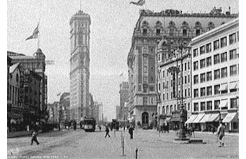 Times Square, New York, 1909. The Astor Hotel is on the right. (Photo Credit: Library of Congress)
Producer Jed Harris described the pre-Equity time best: "It was dog eat dog and vice versa." Attempts at creating a union had been made in the past. In 1896, actors formed the Actors' Society of America, but it was considered more of a club than a union, calling itself a "social and business organization." It tried to negotiate, but it had no teeth. It was weak, so much so that on December 12, 1912, the Society votes to disband. But four men, Charles Coburn, Frank Gillmore, William Harcourt and Milton Sills, just could not let it go. They stayed and began planning a new organization. Later, William Courtleigh suggested a name that encompassed what they were fighting for: "Actors' Equity." 1913 May 26
Actors' Equity Association is founded by 112 actors at the Pabst Grand Circle Hotel. The first president of the union is the comedian Francis Wilson. The composer, director, actor and producer George M. Cohan says, "I will drive an elevator for a living before I will do business with any actors' union." Later a sign will appear in Times Square reading, "ELEVATOR OPERATOR WANTED. GEORGE M. COHAN NEED NOT APPLY." 1914
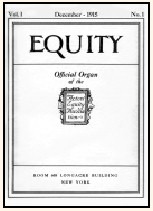 Variety writes, "Europe's Wild Dream War Stopping Show Business." Concern over World War I has shrunk audiences throughout the country. President Woodrow Wilson is quoted in The New York Dramatic Mirror: "If there is a bad act at a vaudeville show, you can rest reasonably secure that the next one may not be so bad; but from a bad play, there is no escape."
|
June 28
Sarajevo: Archduke Franz Ferdinand and his wife are assassinated by a Serbian nationalist, setting in motion a series of events that brings the world to war. The Allies (Britain, France, Russia, Belgium and Serbia, among others) fight The Central Powers (Austria-Hungary and Germany); America watches anxiously, and, for the moment, neutrally. 1915
"Why should the Actors' Equity...have a journal of its own? Because the Association has grown so strong numerically, grown so helpful and powerful professionally, that a publication of its own has become a necessity."
April 20
Jerome Kern and Guy Bolton open Nobody Home at the Princess Theatre, the first in a series of shows which became known as the "Princess Musicals," experiments in fully integrating music and story.
May 7
The Lusitania is sunk by a German torpedo. Broadway producer Charles Frohman and librettist Charles Klein are among the dead.
"The A.E.A. is not a revolutionary body with anarchistic tendencies. It has no grievances save such as are legitimately sustained by evidence of justice. It is not a militant organization to strike terror into the hearts of any set of men. It is, rather, a clearing house for a freer exchange of thought between artist and manager where an understanding is advisable. Its motto is 'Equity'" 1916 "What is the next move?" asks Francis Wilson in Equity Magazine, February 1916. In March, Wilson will give his answer, "Our trail out of the wilderness. That trail is affiliation with organized labor." There may be a problem: The American Federation of Labor can grant only one charter to any occupation or profession to avoid conflicts, and the White Rats Actors' Union of America, a vaudeville performers union, already has the charter for performers. For a while there's a possibility of merging with White Rats, but the bigger problem is getting many actors to see themselves as equal to the members of the AF of L. Many actors want to see themselves only as artists, not as workers. As The New Republic writes in April, "The trouble has been that while the managers live economically in the twentieth century, the actors are in the nineteenth."
"The pride of art is really a wonderful thing - wonderful as long as you keep it active. But the moment you allow it to break out and run wild, it becomes a serious menace to the dinner table."
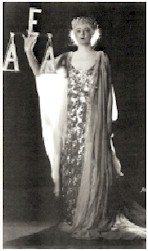
May 29
At the Hotel Astor, Equity members vote to join the American Federation of Labor, 890 to 21. Equity dues in 1916: $5.00 a year Audiences go wild for anything patriotic. In May, George M. Cohan introduces his new song for World War I, "Over There" at the Thirty-Ninth Street Theatre. Cohan will later sell the rights to this song for $25,000. |
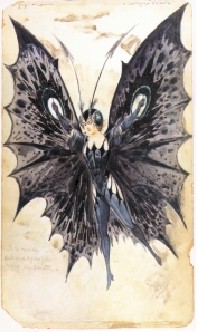
August, 1916
Should Actors Vote? An article in Equity decries voting laws that mandate permanent residence where you pay taxes in order to vote. Due to the transient nature of actors' lives, "if there are 28,000 players in the United States, at least a third of these, or 10,000 in round numbers, are eligible to cast their votes, but are disenfranchised by reason of the requirements of their profession. It is a palpable discrimination against one of the most intellectual professions in the world."
September
The Provincetown Players want to encourage "the writing of American plays of artistic, literary and dramatic - as opposed to Broadway - merit." Their first season includes Eugene O'Neill's Bound East for Cardiff. O'Neill himself appears in the cast. As You Like It is the first production at the St. Louis outdoor theatre that will become the Muny when it incorporates in 1919. With over 10,000 seats, the Muny will go on to become America's oldest and largest outdoor musical theatre. It becomes harder for the U.S. to stay neutral in the war as German submarines target American ships. Woodrow Wilson is reelected, but the election outcome is uncertain for three days until final vote count in California. Wilson has won by only 4,000 votes. 1917 The Russian Revolution begins. March 15: Tsar Nicholas II abdicates. In November, "The October Revolution" begins, toppling Kerensky's government. "The world must be made safe for democracy." April 2: Wilson declares war on Germany. In May, The St. Paul Pioneer Press writes, "Actors are wondering if the theatrical millennium is impending." Why? It is announced that the managers' organization, the United Managers Protective Association, will finally sit down with Equity to hash out a standard contract. Marc Klaw, President of the UMPA still doesn't get it, saying to a reporter, "The most significant feature of the matter is that the actors should be concerned about their contracts at all..." By August, the agreement has been reached, but it is later shown that only one-fifth of the managers are using the contract. A manager tells Francis Wilson that the contract is very fair. When will you start using it, then? asks Wilson. "When you make me," the manager replies.
November 28
Fred Astaire makes his Broadway debut alongside his sister Adele in the show Over the Top.
December 25
The play Why Marry? by Jesse Lynch Williams, a satire exploring the differences between living together and marriage, opens. It will win the first Pulitzer Prize for Drama next year. The Pasadena Playhouse is founded. During the 1930s, 40s and 50s, its College of Theatre Arts becomes known as "Hollywood's talent factory." 1918
August 19
Sergeant Irving Berlin opens his show Yip, Yip, Yaphank! at the Century Theatre. 350 soldiers from Camp Upton are the performers. Berlin himself sings the song "Oh, How I Hate to Get Up in the Morning." Brooks Atkinson later wrote he "conquered New York without having to fire a shot." Broadway producers convince the New York City Health Commissioner not to close Broadway houses during the worldwide flu epidemic that is hitting New York. In Russia, Tsar Nicholas and his family are executed by the Bolsheviks. U.S. forces clash with Germany. Peace talks begin in Paris. Kaiser Wilhelm II abdicates and flees. The new German government accepts Wilson's 14 Points and signs the armistice.
November
The war ends. The U.S. casualties in World War I: of the 4.3 million who served in the fighting forces, 126,000 are dead. Of the dead, 50,000 fell in battle, the rest from the worldwide flu epidemic.
Variety prints headline: "Weary Nation Wants Happiness and Gaiety."
|
||
| to timeline introduction... | ||||
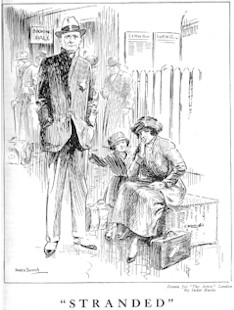
 Father Francis Duffy leaves New York for Europe as the Regimental Chaplain of the 69th New York Volunteer Infantry. Duffy will later become pastor of the Times Square/Hell's Kitchen parish. After his death his statue is put up in what becomes Duffy Square.
Father Francis Duffy leaves New York for Europe as the Regimental Chaplain of the 69th New York Volunteer Infantry. Duffy will later become pastor of the Times Square/Hell's Kitchen parish. After his death his statue is put up in what becomes Duffy Square.